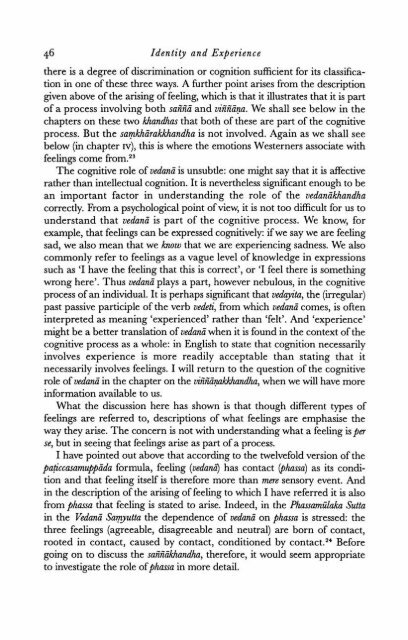Identity and Experience_Hamilton_1996
Identity and Experience_Hamilton_1996
Identity and Experience_Hamilton_1996
You also want an ePaper? Increase the reach of your titles
YUMPU automatically turns print PDFs into web optimized ePapers that Google loves.
46 <strong>Identity</strong> <strong>and</strong> <strong>Experience</strong><br />
there is a degree of discrimination or cognition sufficient for its classification<br />
in one of these three ways. A further point arises from the description<br />
given above of the arising of feeling, which is that it illustrates that it is part<br />
of a process involving both safiti <strong>and</strong> viiiiiiina. We shall see below in the<br />
chapters on these two kh<strong>and</strong>has that both of these are part of the cognitive<br />
process. But the samkhiirakkh<strong>and</strong>ha is not involved. Again as we shall see<br />
below (in chapter IV), this is where the emotions Westerners associate with<br />
feelings come from.23<br />
The cognitive role of vedanii is unsubtle: one might say that it is affective<br />
rather than intellectual cognition. It is nevertheless significant enough to be<br />
an important factor in underst<strong>and</strong>ing the role of the vedanikh<strong>and</strong>ha<br />
correctly. From a psychological point of view, it is not too difficult for us to<br />
underst<strong>and</strong> that vedana' is part of the cognitive process. We know, for<br />
example, that feelings can be expressed cognitively: if we say we are feeling<br />
sad, we also mean that we know that we are experiencing sadness. We also<br />
commonly refer to feelings as a vague level of knowledge in expressions<br />
such as 'I have the feeling that this is correct', or 'I feel there is something<br />
wrong here'. Thus vedanZ plays a part, however nebulous, in the cognitive<br />
process of an individual. It is perhaps significant that vedayita, the (irregular)<br />
past passive participle of the verb vedeti, from which vedanii comes, is often<br />
interpreted as meaning 'experienced' rather than 'felt'. And 'experience'<br />
might be a better translation of vedanii when it is found in the context of the<br />
cognitive process as a whole: in English to state that cognition necessarily<br />
involves experience is more readily acceptable than stating that it<br />
necessarily involves feelings. I will return to the question of the cognitive<br />
role of vedanii in the chapter on the viiiKii@<strong>and</strong>ha, when we will have more<br />
information available to us.<br />
What the discussion here has shown is that though different types of<br />
feelings are referred to, descriptions of what feelings are emphasise the<br />
way they arise. The concern is not with underst<strong>and</strong>ing what a feeling is per<br />
se, but in seeing that feelings arise as part of a process.<br />
I have pointed out above that according to the twelvefold version of the<br />
pakcasamuppa'da formula, feeling (uedan4 has contact &ham) as its condition<br />
<strong>and</strong> that feeling itself is therefore more than mere sensory event. And<br />
in the description of the arising of feeling to which I have referred it is also<br />
from phma that feeling is stated to arise. Indeed, in the Phmmzihka Sutta<br />
in the VedanZ Samyutta the dependence of vedani on phma is stressed: the<br />
three feelings (agreeable, disagreeable <strong>and</strong> neutral) are born of contact,<br />
rooted in contact, caused by contact, conditioned by contact.24 Before<br />
going on to discuss the safiiiikh<strong>and</strong>ha, therefore, it would seem appropriate<br />
to investigate the role of phma in more detail.


